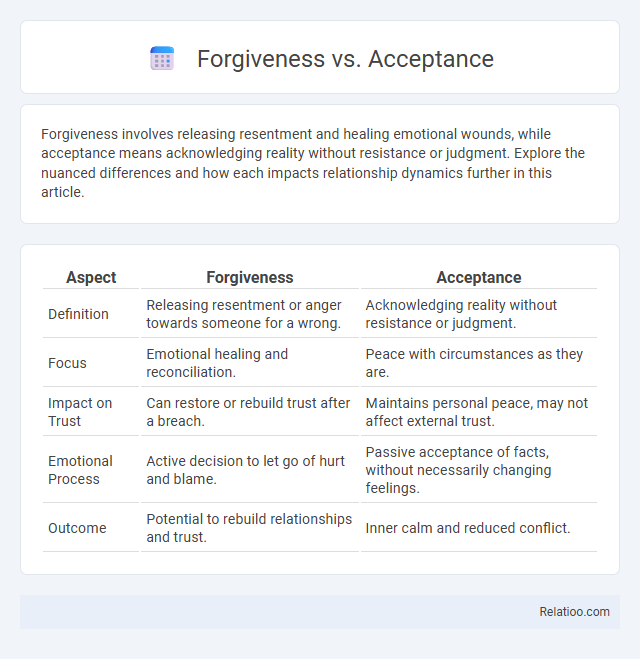Forgiveness involves releasing resentment and healing emotional wounds, while acceptance means acknowledging reality without resistance or judgment. Explore the nuanced differences and how each impacts relationship dynamics further in this article.
Table of Comparison
| Aspect | Forgiveness | Acceptance |
|---|---|---|
| Definition | Releasing resentment or anger towards someone for a wrong. | Acknowledging reality without resistance or judgment. |
| Focus | Emotional healing and reconciliation. | Peace with circumstances as they are. |
| Impact on Trust | Can restore or rebuild trust after a breach. | Maintains personal peace, may not affect external trust. |
| Emotional Process | Active decision to let go of hurt and blame. | Passive acceptance of facts, without necessarily changing feelings. |
| Outcome | Potential to rebuild relationships and trust. | Inner calm and reduced conflict. |
Understanding Forgiveness and Acceptance
Understanding forgiveness involves releasing resentment and finding inner peace, while acceptance means acknowledging reality without resistance. Your emotional healing deepens when you differentiate forgiveness as a conscious choice to let go of grudges, and acceptance as embracing circumstances as they are. Both processes are essential for overcoming pain and fostering personal growth.
Key Differences Between Forgiveness and Acceptance
Forgiveness involves consciously letting go of resentment or anger toward someone who has caused harm, often leading to emotional healing. Acceptance, in contrast, means acknowledging and embracing a situation or reality without necessarily resolving negative feelings or emotions attached to it. The key difference lies in forgiveness actively transforming one's emotional response, while acceptance centers on recognizing and coming to terms with circumstances as they are.
The Psychological Impact of Forgiveness
The psychological impact of forgiveness plays a crucial role in emotional healing, reducing stress, and promoting mental well-being. Unlike acceptance, which involves acknowledging a situation without judgment, forgiveness allows you to release resentment and anger, fostering inner peace and improving psychological resilience. Choosing forgiveness over holding grudges can lead to lower anxiety levels and a healthier mindset, enhancing your overall quality of life.
The Role of Acceptance in Emotional Healing
Acceptance plays a crucial role in emotional healing by allowing you to acknowledge reality without resistance or judgment, which reduces emotional pain and promotes inner peace. Unlike forgiveness, which involves letting go of resentment toward others or yourself, acceptance focuses on embracing the present moment and your feelings as they are. This mindset fosters resilience and helps transform suffering into growth, making it essential for long-term emotional well-being.
Forgiveness: Myths and Misconceptions
Forgiveness is often misunderstood as forgetting or excusing harmful behavior, but it actually involves consciously choosing to release resentment while acknowledging the wrongdoing. Many myths suggest forgiveness means reconciling with the offender or minimizing the impact of their actions, yet true forgiveness primarily benefits Your emotional well-being and healing process. Understanding these misconceptions helps clarify that forgiveness is a personal journey of letting go rather than condoning or forgetting the offense.
Acceptance: Letting Go vs. Approving Behavior
Acceptance involves acknowledging reality and emotions without necessarily approving the behavior that caused pain, emphasizing a mindful letting go rather than condoning actions. Forgiveness often implies releasing resentment and moving past the offense, whereas acceptance focuses more on inner peace by embracing the situation as it is. Letting go through acceptance promotes emotional healing without requiring approval, distinguishing it from forgiveness where moral judgment may still be present.
When Should You Forgive or Accept?
Forgiveness involves letting go of resentment toward someone who has hurt you, while acceptance means recognizing and making peace with an unchangeable situation. You should forgive when holding onto anger affects your emotional well-being, but accept when the reality cannot be changed and continuing to fight it causes prolonged stress. Understanding the difference helps improve mental health and fosters emotional resilience.
Steps to Practice Forgiveness
Practicing forgiveness involves acknowledging your pain, expressing your emotions honestly, and making a conscious decision to let go of resentment toward the person who wronged you. You must cultivate empathy by understanding the offender's perspective and practicing self-compassion to heal emotional wounds. Regularly engaging in reflective journaling and mindfulness meditation can strengthen your commitment to forgiveness, distinguishing it from mere acceptance or tolerance.
Techniques for Cultivating Acceptance
Techniques for cultivating acceptance include mindfulness meditation, which helps you observe thoughts and emotions without judgment, fostering a sense of peace. Practicing self-compassion allows you to embrace your experiences and imperfections, promoting emotional healing. Journaling about your feelings encourages deeper understanding and acceptance, leading to greater psychological resilience.
Choosing Forgiveness, Acceptance, or Both in Personal Growth
Choosing forgiveness involves releasing resentment and healing emotional wounds, which fosters inner peace and resilience. Acceptance acknowledges reality without resistance, promoting clarity and emotional balance in face of challenges. Combining both forgiveness and acceptance enhances personal growth by enabling individuals to move forward while embracing their experiences constructively.

Infographic: Forgiveness vs Acceptance
 relatioo.com
relatioo.com